2021人教版选修九unit2《sailingtheoceans》word教案2
高中人教版选修九高三教学设计:选修9 Unit 2 Sailing the oceans

优质资料---欢迎下载Book 9 Unit 2 Sailing the Oceans(Warming up、Pre-reading、Reading )教学设计一、教学分析1.教学内容分析本课选自人教版高中英语选修9第二单元“热身、读前和阅读”部分。
“热身”部分主要介绍了几位航海家,以及如何区分“航海家”和“探险家”;“读前”部分以图片的形式呈现了古代航海的仪器;阅读部分的标题为Sailing the Oceans, 用百科全书的形式首先介绍了在现代航海仪器发明之前,古代航海者怎样借助自然环境的帮助进行航海,然后介绍了他们怎样利用一些简单的仪器确定经纬度。
2.学情分析从真实环境方面来讲,嘉峪关市地处西北内陆,对海洋的切身体会非常少,海洋知识主要源于课本,本单元相关的海洋词汇也较为生僻,学生不易掌握,而且相关知识不够,所以学生参与的客观背景是一大制约。
但是,“海洋探险”这个话题,容易激发学习兴趣,学生有话愿说(虽然对海洋所知较少),教师担心学生容易出现“心有余力不足”现象,所以导入环节不能太难。
3.教学思路分析⑴备课思路本课文本是关于古代海洋探险方面的说明文,应该来讲因为我校学生缺少海洋方面的相关知识,体验不足,词汇储备也不足,所以在教学设计方面主要考虑以下几步:①在热身环节尽可能生动、已知,强调“教学就是从学生的已知出发”(孙勇,2018),抢先唤起学生学习的积极性。
②围绕生词,设计相关的任务,使学生尽快熟悉单词便于为后续教学扫除障碍。
③本篇课文篇幅较长,理解难度较大,所以,一定要给学生留下足够的时间阅读,不能仅仅“走过场”。
④本着英语课堂倡导指向学科核心素养的英语学习活动观的定位,在设计上要有“综合性、关联性和实践性特点”(《普通高中英语课程标准》,2017年版),本节课尝试“以读促写,读写结合”的教学实践,提高学生多方面的语言运用能力。
⑵课堂教学活动设计⑶教学内容整合杨海春(2017)指出,在具体的课堂教学中,教师需要对教材内容、教材结构进行再设计,让教学内容贴近学生的生活体验。
最新人教版高三英语选修9-Unit-2---Sailing-the-oceans全单元教案
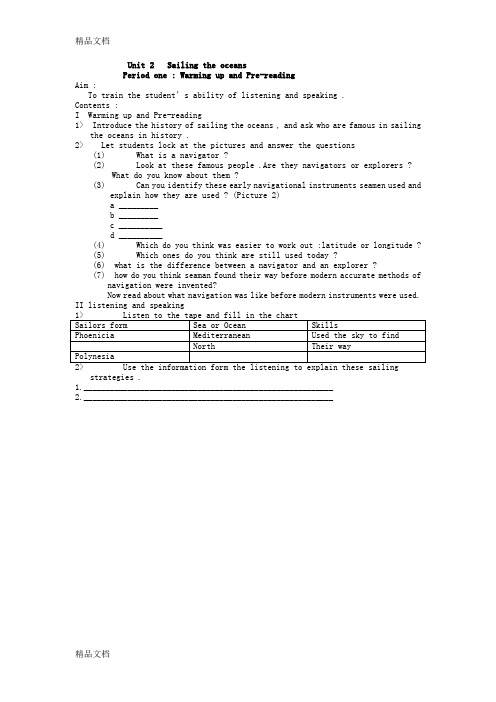
Unit 2 Sailing the oceansPeriod one : Warming up and Pre-readingAim :To train the student’s ability of listening and speaking .Contents :I Warming up and Pre-reading1> Introduce the history of sailing the oceans , and ask who are famous in sailingthe oceans in history .2> Let students lock at the pictures and answer the questions(1) What is a navigator ?(2) Look at these famous people .Are they navigators or explorers ?What do you know about them ?(3) Can you identify these early navigational instruments seamen used andexplain how they are used ? (Picture 2)a _________b _________c __________d __________(4) Which do you think was easier to work out :latitude or longitude ?(5) Which ones do you think are still used today ?(6) what is the difference between a navigator and an explorer ?(7) how do you think seaman found their way before modern accurate methods ofnavigation were invented?Now read about what navigation was like before modern instruments were used. II listening and speakingstrategies .1._________________________________________________________2._________________________________________________________Period two: readingAim :Let students master some language points and understand the text .Contents : Reading : sailing the oceans1> Answer some questions about the text1. How many ways the passage tells us to keep alongside thecoastline .2. When can the sailors use the sun to navigate by ?3. What was the first instrument to measure the sun’s position .4. What proved to be the most accurate and reliable of these earth navigational instruments ?5. When did seamen begin to use the compass ?2> Language points :1. voyage : n. long journey , by sea or in space2. mercy : n. kindness ; forgivenessphr : at the mercy of : under the control of 任由… …的摆布without mercy 毫不留情地The beat was at the mercy of the rapid river .For mercy ‘s sake 请发慈悲For Cod’s sake3. nowhere adv .not anywhere 无处eg : I went nowhere 不知来自哪里,以不知名状态go nowhere vi 无所成,进行得不顺利get sb nowhere 某某事对某人无帮助、元效4. reference n. act of mentioning ; act of looking at forinformation .phr : (1) have reference to 和… …有关系(2) in reference to 关于(3) make (a) reference to 说到谈到(4) reference book 参考书刊号(5) reference material 参考资料(6) with reference to 关于就… …而论 whit reference to the contextvi refer: refer to (a) 指的是(b)参考 (c) 提到谈到refer to A as B 将A称为Beg : Are you referring to me ?In his s peech, he didn’t refer to the problem at all .He cooked dinner by referring to a cookbook .California is referred to as the “G olden State .”5. survival: n. state of continuing to live 生存、幸存survive: vt.sb survive 某人幸存下sth survive 某物保留下来vi. survive sb by 活得比某人长… …survive sth 从… … 中幸存、幸存于…eg : Only one baby survived the terrible car crash .The girl survived her parents .Survivor n. the person or thing of surviving .6. dusk n. time before nightat dusk 在黄昏时刻Period three : comprehending and languageI ComprehendingRead the passage and answer the following questions .1 . What is the use of a bearing circle . astrolabe , quadrant or sextant ?( )What is the use of a compass ? ( )A to set the course of the shipB to measure the position of the shipC to measure the speed of the shipD to tell the time2. Why are speed and time important in working out the longitude of a ship ?3. Why is the position of the sun and various stars useful for working outlatitude ?4. Suppose you were a sea captain aiming to sail round Africa Discuss in groups.(1) what skills would you seek in your sailors ?(2) what problems would you anticipate for this journey ?II Learning about languageDo exercises 1 . 2 and 3Exerise1 Replace the words underlined by ones of similar meaning form the reading passage .1. Seeing the dark clouds above him , George hurried for home .2. Sailing a boat alone far away form the shore made Flora’s parentsworry about her safety .3. Clare , would you please put your bicycle next to the others in theshed ?4. “Why don’t you plot a more simple rout with the smallest numberof sp ots?” asked Mary .5. Setting out on a long journey by sea with unskilled sailors would bedangerous especially if there were no modern navigational instruments . Exercise2 Find the words form the reading passage that are the opposite of these compound words .Nowhere anywhere download upload outward inwardReliable unreliable seaweed land flower shortcoming strong point Exercise3:Complete the following paragraph with the words below .precise outward nowhere awkward reference seaweedaccelerate mercy randomly voyage alongside approximateSamuel the sailor was extremely good at plotting his course using the stars a ________.One day he was determined to set out on a ________across an unknown sea to an unknown continent . He set out with his instruments so he would not be at the _________ Of the sea . He found on his _______journey a rocky island . It seemed to be covered in nests. Suddenly, as Samuel looked , an enormous bird swooped down and picked him up as if he were a/an ______ parcel . It ______its speed and rose straight up into the air so as to reach the _______place on the rocks where its nest lay. Once there, it shook itself and threw Samuel in the ________ direction of the nest . There seemed to be ______to hide but then he noticed lots of ______ on his left and quickly hid under it . The bird landed nearby and pecked ______ at the rocks . Samuel rolled over swiftly and found himself at the edge of the cliff . He looked down slowly with a beating heart. Below him was his boat lying ______the shore! “How lucky I am!”Samuel thought to himself. He then gave a mighty leap and landed in it. Once inside he could safely sail away.Period four : Reading speaking and writingAim :to train th e student’s ability of listening and speaking and writing Contents : some language points1〉starvation : n. suffering or death from lack of food die of starvation starve : vt/vi (使某人)饿死、挨饿starve sb to deathphr: starve for sth to do sthbe starved of vt 缺乏……欠缺……2> gradually : adj not suddenlygradual : adj happening slowlyeg : a gradual increase in populationHer health is gradually improving3> tear : vt/vi 撕裂扯破tear sthsth from /off /out of……adv (away off out up down 连用)phr tear apart 拆散、使分离tear at 用力扯tear down 扯下、撕毁tear into 攻击某人、指责tear off 扯掉、撕掉tear oneself away from 忍痛离开、分离tear up 撕裂、撕毁(合同)4> extreme : adj 1在尽头的eg : the extreme borders of a countryStand at the extreme edge of the bank2.极度的、最大的、极端的an extreme casebe in extreme danger3.极严厉的、猛烈的take extreme measuresn. 极端、极端的、措施、手段等be forced to an unpleasant extreme .5> thirst :n. 口渴、渴望a thirst for knowledgevi 口渴、渴望thirst for 渴望某物to 渴求做……eg : thirst to learnThe story is so gipping ; it makes you thirst for the next episode .II Let students write a report to their leader explaining to him why you think captain Bligh shoulder receive the medal。
人教版高中英语选修9Unit2《Sailingtheoceans》word词汇讲解
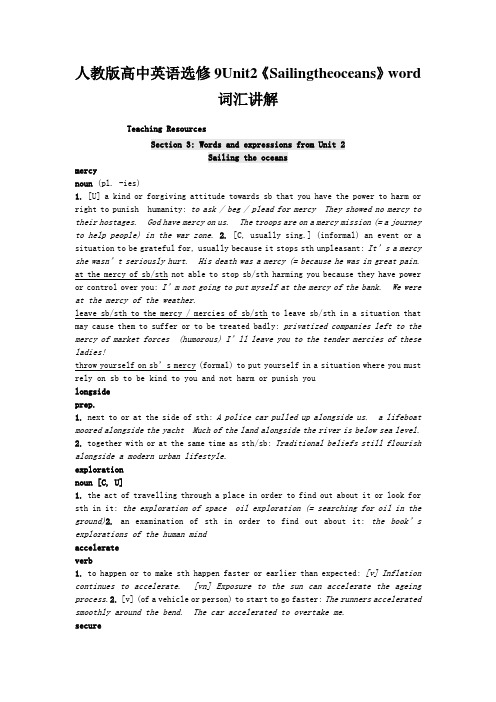
人教版高中英语选修9Unit2《Sailingtheoceans》word词汇讲解Teaching ResourcesSection 3: Words and expressions from Unit 2Sailing the oceansmercynoun (pl. -ies)1. [U] a kind or forgiving attitude towards sb that you have the power to harm or right to punish humanity: to ask / beg / plead for mercy They showed no mercy to their hostages. God have mercy on us. The troops are on a mercy mission (= a journey to help people) in the war zone.2. [C, usually sing.] (informal) an event or a situation to be grateful for, usually because it stops sth unpleasant: It’s a mercy she wasn’t seriously hurt. His death was a mercy (= because he was in great pain. at the mercy of sb/sth not able to stop sb/sth harming you because they have power or control over you:I’m not going to put myself at the mercy of the bank. We were at the mercy of the weather.leave sb/sth to the mercy / mercies of sb/sth to leave sb/sth in a situation that may cause them to suffer or to be treated badly: privatized companies left to the mercy of market forces (humorous) I’ll leave you to the tender mercies of these ladies!throw yourself on sb’s mercy(formal) to put yourself in a situation where you must rely on sb to be kind to you and not harm or punish youlongsideprep.1. next to or at the side of sth: A police car pulled up alongside us. a lifeboat moored alongside the yacht Much of the land alongside the river is below sea level.2. together with or at the same time as sth/sb: Traditional beliefs still flourish alongside a modern urban lifestyle.explorationnoun [C, U]1. the act of travelling through a place in order to find out about it or look for sth in it: the exploration of space oil exploration (= searching for oil in the ground)2.an examination of sth in order to find out about it: the book’s explorations of the human mindaccelerateverb1. to happen or to make sth happen faster or earlier than expected: [v] Inflation continues to accelerate. [vn] Exposure to the sun can accelerate the ageing process.2.[v] (of a vehicle or person) to start to go faster: The runners accelerated smoothly around the bend. The car accelerated to overtake me.secureadj.HAPPY / CONFIDENT1. feeling happy and confident about yourself or a particular situation: At last they were able to feel secure about the future. She finished the match, secure in the knowledge that she was through to the next round.CERTAIN / SAFE2.likely to continue or be successful for a long time; safe: a secure job / income It’s not a very secure way to make a livi ng. The future of the company looks secure.3.~ (against / from sth) that cannot be affected or harmed by sth: Information must be stored so that it is secure from accidental deletion.BUILDING / DOOR / ROOM4.guarded and/or made stronger so that it is difficult for people to enter or leave: Check that all windows and doors have been made as secure as possible. a secure unit for child offenders The building is secure against intruders.FIRM5.not likely to move, fall down, etc.; stable: The aerial doesn’t look very secure to me. It was difficult to maintain a secure foothold on the ice. (figurative) Our relationship was now on a more secure footing.verbGET STH1.~ sth (for sb/sth)| ~ sb sth (formal) to obtain or achieve sth, especially when this means using a lot of effort:[vn] to secure a contract / deal The team managed to secure a place in the finals. She secured2. 000 votes. The delegation has secured the promise of a ceasefire. [vn, vnn] He secured a place for himself at law school. He secured himself a place at law school.FASTEN FIRMLY2. [vn] ~ sth (to sth) to attach or fasten sth firmly: She secured the rope firmly to the back of the car. The tables on board were secured firmly to the floor. PROTECT FROM HARM3.[vn] ~ sth (against sth) to protect sth so that it is safe and difficult to attack or damage: to secure a property against intruders The windows were secured with locks and bars. (figurative) a savings plan that will secure your child’s futureA LOAN4.[vn] to legally agree to give sb property or goods that are worth the same amount as the money that you have borrowed from them, if you are unable to pay the money back: a loan secured on the houserandomadj. [usually before noun] done, chosen, etc. without sb deciding in advance what is going to happen, or without any regular pattern: the random killing of innocent people a random sample / selection (= in which each thing has an equal chance of being chosen) The information is processed in a random order.nounat random without deciding in advance what is going to happen, or without any regular pattern: She opened the book at random (= not at any particular page) and startedreading. The terrorists fired into the crowd at random. Names were chosen at random from a list.awkwardadj.1.making you feel embarrassed: There was an awkward silence. I felt awkward because they obviously wanted to be alone.2. difficult to deal with:Don’t ask awkward questions. You’ve put me in an awkward position. an awkward custome r (= a person who is difficult to deal with) Please don’t be awkward about letting him come. It makes things awkward for everyone when you behave like that.3. not convenient, inconvenient: Have I come at an awkward time?4. difficult or dangerous because of its shape or design: This box is very awkward for one person to carry. This tool will reach into awkward corners, such as under kitchen units.5.not moving in an easy way; not comfortable: He tried to dance, but he was too clumsy and awkward. I must have slept in an awkward position—I’m aching all over.referencenounMENTIONING SB / STH1. [C, U] ~ (to sb/sth) a thing you say or write that mentions sb/sth else; the act of mentioning sb/sth: The book is full of references to growing up in India. She made no reference to her illness but only to her future plans. the President’s passing reference to (= brief mention of) the end of the warLOOKING FOR INFORMATION2.[U] the act of looking at sth for information: Keep the list of numbers near the phone for easy reference. I wrote down the name of the hotel for future reference (= because it might be useful in the future). The library contains many popular works of reference (= reference books).ASKING FOR ADVICE3.[U] ~ (to sb/sth) (formal) the act of asking sb for help or advice: The emergency nurse can treat minor injuries without reference to a doctor.NUMBER / WORD / SYMBOL4. [C] (abbr. ref.) a number, word or symbol that shows where sth is on a map, or where you can find a piece of information: The map reference is Y4.. Please quote your reference number when making an enquiry.FOR NEW JOB5.[C] a letter written by sb who knows you, giving information about your character and abilities, especially to a new employer: We will take up references after the interview.6. [C] a person who agrees to write a reference, for you, for example when you are applying for a job: My previous boss will act as a reference for me.IN BOOK7.[C] a note in a book that tells you where a particular piece of information comes from: There is a list of references at the end of each chapter.in / with reference to(formal) used to say what you are talking or writing about:With reference to your letter of July 22...verb [vn] (formal) to refer to sth; to provide a book, etc. with references: Each chapter is referenced, citing literature up to 2004.preciseadj.1. clear and accurate; exact: precise details / instructions / measurements Can you give a more precise definition of the word? I can be reasonably precise about the time of the incident.2.[only before noun] used to emphasize that sth happens at a particular time or in a particular way: We were just talking about her when, at that precise moment, she walked in. Doctors found it hard to establish the precise nature of her illness.3. taking care to be exact and accurate, especially about small details: a skilled and precise worker small, precise movements (disapproving) She’s rather prim and precise.to be (more) pr ecise used to show that you are giving more detailed and accurate information about sth you have just mentioned: The shelf is about a metre long—well, 98cm, to be precise.simplifyverb (simplifies, simplifying, simplified, simplified) [vn] to make sth easier to do or understand: The application forms have now been simplified. I hope his appointment will simplify matters. a simplified version of the story for young childrenportableadj. that is easy to carry or to move: a portable TV The equipment is lightweight, portable and easy to store. (figurative) a portable loan / pension (= that can be moved if you change banks, jobs, etc.) portable softwarenoun a small type of machine that is easy to carry, especially a computer or a television: The kids are upstairs watching the portable (= television). shortcomingnoun[usually pl.] a fault in sb’s character, a plan, a system, etc.: She made me aware of my own shortcomings. Despite a number of shortcomings, the project will still go ahead.updateverb [vn]1. to make sth more modern by adding new parts, etc.: It’s about time we updated our software.2. ~ sb (on sth)| ~ sth to give sb the most recent information about sth; to add the most recent information to sth bring up to date: I called the office to update them on the day’s developments. Ou r records are regularly updated. tendencynoun (pl. -ies)1. [C] ~ (for sb/sth) (to do sth)| ~ (to / towards sth) if sb/sth has a particular tendency, they are likely to behave or act in a particular way: to display artistic, etc. tendencies I have a tendency to talk too much when I’m nervous. There is a tendency for this disease to run in families. She has a strong natural tendency towards caution. This material has a tendency to shrink when washed.2.[C] ~ (forsb/sth) (to do sth)| ~ (to / towards sth) a new custom that is starting to develop: There is a growing tendency among employers to hire casual staff.3. [C+sing./pl. v.] (BrE) a group within a larger political group, whose views are more extreme than those of the rest of the group: the militant tendencyreliableadj.1.that can be trusted to do sth well; that you can rely on; dependable: We are looking for someone who is reliable and hard-working. a reliable friend My car’s not as reliable as it used to be.2. that is likely to be correct or true: Our information comes from a reliable source. a reliable witness How reliable are the local weather forecasts? These tests are a reliable indicator of future performance. swoopverb [v]1.[usually +adv. / prep.] (of a bird or plane) to fly quickly and suddenly downwards, especially in order to attack sb/sth; dive: The aircraft swooped down over the buildings. A hawk swooped low over the field.2.~ (on sb/sth) (especially of police or soldiers) to visit or attack sb/sth suddenly and without warning: Officers swooped on the vehicles as they left the ferry.noun1. an act of moving suddenly and quickly through the air in a downward direction, as a bird does dive2.~ (on sth/sb) an act of arriving somewhere or attacking sth/sb in a way that is sudden and unexpected:Large quantities of drugs were found during a police swoop on the star’s New York home.peckverb1. ~ (at sth) (of birds) to move the beak forward quickly and hit or bite sth: [v]A robin was pecking at crumbs on the ground. Hens pecked around in the yard. [vn] A bird had pecked a hole in the sack. Vultures had pecked out the dead goat’s eyes.2. [vn] ~ sb (on sth) (informal) to kiss sb lightly and quickly: He pecked her on the cheek as he went out. She pecked his cheek.a / the pecking order (inform al, often humorous) the order of importance in relation to one another among the members of a group: New Zealand is at the top of the pecking order of rugby nations. to be first in the pecking orderpeck at sth to eat only a very small amount of a meal because you are not hungry; pick at: She sat nervously pecking at her food.expeditionnoun1. an organized journey with a particular purpose, especially to find out about a place that is not well known:to plan / lead / go on an expedition to the North Pole2.the people who go on an expedition: Three members of the Everest expedition were killed.3.(sometimes humorous) a short trip that you make when you want or need sth: a shopping expeditioncompulsoryadj. that must be done because of a law or a rule: It is compulsory for allmotorcyclists to wear helmets. English is a compulsory subject at this level. compulsory education / schooling compulsory redundanciesSurvivalnoun1.[U] the state of continuing to live or exist, often despite difficulty or danger: the struggle / battle / fight for survival His only chance of survival was a heart transplant. Exporting is necessary for our economic survival. Continued trade in these products is a threat to the survival of the species.2. [C] ~ (from sth) something that has continued to exist from an earlier time: The ceremony is a survival from pre-Christian times.the survival of the fittest the principle that only the people or things that are best adapted to their surroundings will continue to existincidentnoun1.[C] something that happens, especially sth unusual or unpleasant: His bad behaviour was just an isolated incident. One particular incident sticks in my mind.2.[C, U] a serious or violent event, such as a crime, an accident or an attack: There was a shooting incident near here last night. The demonstration passed off without incident.3. [C] a disagreement between two countries, often involving military forces: a border / diplomatic incidentdeparturenoun1. [C, U] ~ (from ... ) the act of leaving a place; an example of this: His sudden departure threw the office into chaos. Flights should be confirmed 4.8 hours before departure. They had received no news of him since his departure from the island.2. [C] a plane, train, etc. leaving a place at a particular time: arrivals and departures All departures are from Manchester. the departure lounge / time / gate the departures board3. [C] ~ (from sth) an action that is different from what is usual or expected: It was a radical departure from tradition. Their latest single represents a new departure for the band.depositnounMONEY1. [usually sing.] a ~ (on sth) a sum of money that is given as the first part ofa larger payment: We’ve put down a 5.% deposit on the house. They normally ask you to pay £1.00 (as a) deposit. All deposits are non-refundable. 2. [usually sing.] a sum of money that is paid by sb when they rent sth and that is returned to them if they do not lose or damage the thing they are renting: to pay a deposit They’l l probably ask you to leave a deposit.3. a sum of money that is paid into a bank account: Deposits can be made at any branch. 4. (in the British political system) the amount of money that a candidate in an election to Parliament has to pay, and that is returned if he/she gets enough votes: All the other candidates lost their deposits.verb [vn]PUT DOWN1. [+adv. / prep.] to put o r lay sb/sth down in a particular place: She depositeda pile of books on my desk. (informal) I was whisked off in a taxi and deposited outside the hotel.LEAVE SUBSTANCE2. (especially of a river or a liquid) to leave a layer of sth on the surface of sth, especially gradually and over a period of time: Sand was deposited which hardened into sandstone.MONEY3.to put money into a bank account: Millions were deposited in Swiss bank accounts. reckonverb1.(informal, especially BrE) to think sth or have an opinion about sth: [v (that)]I reckon (that) I’m going to get that job. He’ll be famous one d ay. What do you reckon (= do you agree)? [v] It’s worth a lot of money, I reckon. ‘They’ll never find out.’ ‘You reckon?’ (= I think you may be wrong about that) 2.be reckoned (not used in the progressive tenses) to be generally considered to be sth: [vn to inf] Children are reckoned to be more sophisticated nowadays. [vn-n] It was generally reckoned a success. [also vn-adj] 3.[v to inf] (BrE, informal) to expect to do sth:We reckon to finish by ten. He wasn’t reckoning to pay so much.4. ~ sth (at sth) to calculate an amount, a number, etc.: [vn] I could see him reckoning the cost as I spoke. The age of the earth is reckoned at about 4.6.00 million years. [v (that)] They reckon (that) their profits are down by at least 2.0%. [vn to inf] The journey was reckoned to take about two hours.reckon on sth to expect sth to happen or to rely on sth happening: They hadn’t reckoned on a rebellion. [+ -ing] We’d reckoned on having good weather.reckon sth up / reckon up sth(especially BrE) to calculate the total amount or number of sth: He reckoned up the cost of everything in his mind.reckon with sb/sth1. [usually passive] to consider or treat sb/sth as a serious opponent, problem, etc.: They were already a political force to be reckoned with.2. (usually used in negative sentences) to consider sth as a possible problem that you should be prepared for; take sth into account: [+ -ing] I didn’t reckon with getting caught up in so much traffic.reckon without sb/sth (especially BrE) to not consider sb/sth as a possible problem that you should be prepared for; not take sth into account: They had reckoned without the determination of the opposition.tensionnoun1. [U, C, usually pl.] ~ (between A and B) a situation in which people do not trust each other, or feel unfriendly towards each other, and which may cause them to att ack each other: There is mounting tension along the border. international / racial / political tensions Family tensions and conflicts may lead to violence. The incident has further increased tension between the two countries.2.[C, U] ~ (betweenA and B) a situation in which the fact that there are different needs or interests causes difficulties: There is often a tension between the aims of the company and the wishes of the employees.3. [U] a feeling of anxiety and stress that makes it impossible to relax:nervous tension We laughed and that helped ease the tension. Walking and swimming are excellent for releasing tension. a tension headac he 4. [U] the feeling of fear and excitement that is created by a writer or a film/movie director: dramatic tension As the movie progresses the tension builds.5. [U] the state of being stretched tight; the extent to which sth is stretched tight: muscular tension Adjust the string tension of your tennis racket to suit your style of playing. When knitting, try to keep the same tension throughout. Massage can relieve tension in your shoulders and back.verb [vn] (technical) to make a wire, sail, etc. tight and stretchedgradualadj.1.happening slowly over a long period; not sudden: a gradual change in the climate Recovery from the disease is very gradual.2. (of a slope) not steepforeseeverb (foresaw, foreseen ) to think sth is going to happen in the future; to know about sth before it happens; predict: [vn] We do not foresee any problems. The extent of the damage could not have been foreseen. [v (that)] No one could have foreseen (that) things would turn out this way. [v wh-] It is impossible to foresee how life will work out. [also vn -ing]thirstnoun1.[U, sing.] the feeling of needing or wanting a drink:He quenched his thirst witha long drink of cold water. She woke up with a raging thirst and a headache.2.[U] the state of not having enough water to drink: Thousands are dying of thirst.3.[sing.] ~ (for sth) a strong desire for sth: a thirst for knowledgetearverb (tore ,torn)DAMAGE1. to damage sth by pulling it apart or into pieces or by cutting it on sth sharp; to become damaged in this way; rip: [vn] I tore my jeans on the fence. I tore a hole in my jeans. He tore the letter in two. a torn handkerchief [vn-adj] I tore the package open. I tore open the package. [v] Careful—the fabric tears very easily.2. [vn] ~ sth in sth to make a hole in sth by force; rip: The blast tore a hole in the wall.REMOVE FROM STH / SB3.[vn + adv. / prep.] to remove sth from sth else by pulling it roughly or violently; rip: The storm nearly tore the roof off. I tore another sheet from the pad. He tore his clothes off (= took them off quickly and carelessly) and dived into the lake.4.~ yourself / sb (from sb/sth) to pull yourself/sb away by force from sb/sth that is holding you or them:[vn] She tore herself from his grasp. [vn-adj] He tore himself free.INJURE MUSCLE5. [vn] to injure a muscle, etc. by stretching it too much: a torn ligament She tore a calf muscle playing squash.MOVE QUICKLY6. [v + adv. / prep.] to move somewhere very quickly or in an excited way: He tore off down the street. A truck tore past the gates.-TORN7. (in adjectives) very badly affected or damaged by sth: to bring peace to a strife-torn country a strike-torn industrytear sb/sth apart, to shreds, to bits, etc. to destroy or defeat sb/sth completely or criticize them or it severely: We tore the other team apart in the second half. The critics tore his last movie to shreds.tear at your heart / tear your heart out (formal) to strongly affect you in an emotional waytear your hair (out) (informal) to show that you are very angry or anxious about sth: She’s keeping very calm—anyone else would be tearing their hair out. (be in) a tearing hurry / rush (especially BrE) (to be) in a very great hurry be torn (between A and B)to be unable to decide or choose between two people, things or feelings: I was torn between my parents and my friend.tear sb off a strip / tear a strip off sb(BrE, informal) to speak angrily to sb who has done sth wrongthat’s torn it (BrE, informal) used to say that sth has happened to spoil your plans—more at heart, limb, loose adj.tear sb apart / tear apart sb to make sb feel very unhappy or worried; rip sb apart: It tears me apart to think I might have hurt her feelings. His distress tore me apart.tear sth apart / tear apart sth1. to destroy sth violently, especially by pulling it to pieces: The dogs tore the fox apart.2. to make people in a country, an organization or other place fight or argue with each other: Racial strife is tearing our country apart.3. to search a place, making it look untidy and causing damage: They tore the room apart, looking for money.tear at sth to pull or cut sth violently so that it tears: He tore at the meat with his bare hands.tear yourself away (from sth)/ tear sth away (from sth)to leave somewhere even though you would prefer to stay there; to take sth away from somewhere: Dinner’s ready, if you can tear yourself away from the TV. She was unable to tear her eyes away from him (= could not stop looking at him).tear sth down / tear down sth to pull or knock down a building, wall, etc.: They’re tearing down these old houses to build a new office block.tear into sb/sth1. to attack sb/sth physically or with words: The wind tore into him.2. to start doing sth with a lot of energy: They tore into their food as if they were starving. The band tore into their opening number.tear sth up / tear up sth to destroy a document, etc. by tearing it into pieces; rip sth up: She tore up all the letters he had sent her. (figurative) He accused t he leader of tearing up the party’s manifesto (= of ignoring it).hardshipnoun [U, C] a situation that is difficult and unpleasant because you do not have enough money, food, clothes, etc.: economic / financial, etc. hardship People suffered many hardships during that long winter. The two men endured great hardship during their trek across Antarctica. It was no hardship to walk home on such a lovely evening.backgroundnounFAMILY / EDUCATION, etc.1.[C] the details of a person’s family, education, experience etc.: a person’s family / social / cultural / educational / class background The job would suit someone with a business background. In spite of their very different backgrounds, they immediately became friends.PAST2. [C, usually sing., U] the circumstances or past events which help explain why sth is how it is; information about these: the historical background to the war background information / knowledge The elections are taking place against a background of violence. Can you give me more background on the company?OF PICTURE / PHOTO3. [C, usually sing.] the part of a picture, photograph or view behind the main objects, people, etc.: a photograph with trees in the backgroundLESS IMPORTANT POSITION4. [sing.] a position in which people are not paying attention to sb/sth or not as much attention as they are paying to sb/sth else: He prefers to remain in the background and let his assistant talk to the press. A piano tinkled gent ly in the background. background music There was a lot of background noise (= that you could hear, but were not listening to).COLOUR UNDER STH5. [C, usually sing.] a colour or design on which sth is painted, drawn, etc.: The name of the company is written in red on a white background.in the background (computing) (of a computer program) not being used at the present time and appearing on the screen behind programs that are being usedroarverb1. [v] to make a very loud, deep sound: We heard a lion roar. The gun roared deafeningly. The engine roared to life (= started noisily). The wind was roaring in my ears.2. ~ (sth) (out) to shout sth very loudly: [v] The crowd roared. [vn] The fans roared (out) their approval. He roared out James’s name. [v speech] ‘Stand back,’ he roared.3.[v] ~ (with laughter) to laugh very loudly: He looked so funny, we all roared. It made them roar with laughter.4.[v + adv. / prep.] (of a vehicle or its rider / driver) to move very fast, making a lot of noise: She puther foot down and the car roared away. A group of young men on motorcycles roared past.5. [v] (of a fire) to burn brightly with a lot of flames, heat and noise: A log fire was roaring in the hearth.noun1.a loud deep sound made by an animal, especially a lion, or by sb’s voice: His speech was greeted by a roar of applause. roars of laughter2. a loud continuous noise made by the wind or sea, or by a machine: I could barely hear above the roar of traffic. the roar of the Atlantic。
人教版高中英语选修9课件 Unit 2《Sailing the oceans》课件
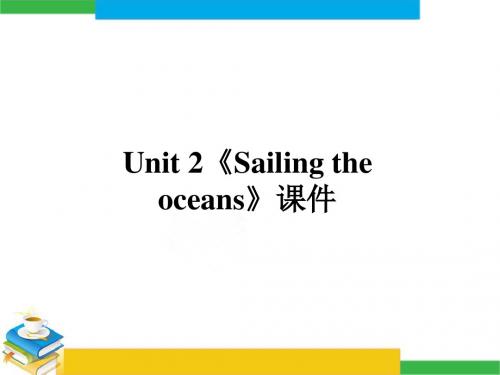
拓展 exploration n. 探险;探测 explorer n. 探险者
练习 请根据中文完成英文句子。 ⑴ 我们想探索的一件事是他们如何 研究出这些化学知识。 we want to explore One thing ___________________ is how they developed their knowledge of chemistry.
4. deposit n. 存款; 定金; 沉淀物vt. 存放; 堆 积vi. 沉淀
例句: He deposited office. 他把箱子放在行李寄存处。
The Nile floods the fields and deposits mud on them. 尼罗河泛滥, 在田野上淤积一层泥。
1. explore vt. 探究;探险;探测;浏览 例句: The experts are exploring every part of the island. 专家们正在勘查这个 岛的各个部分。 He had an itch to get away and explore. 他等不及要动身去探险。
5. reckon v. 计算; 认为, 估计; 指望 例句: We reckon him to be the best goalkeeper in the world. 我们认为他 是世界上最好的足球守门员。 搭配: reckon on指望;依赖
练习 指出划线部分的汉语意思。 ⑴ I reckon this will be a hot summer. 估计 ) (意思: ______
拓 accelerated adj. 加速的 展 acceleration n. 加速; 促进; 加速度
搭配
accelerated motion n. [物]加速运动 accelerate key 快捷键
高中英语(人教版)选修九Unit2Sailingtheoceans同步课件教案课件教案和测试(参考)
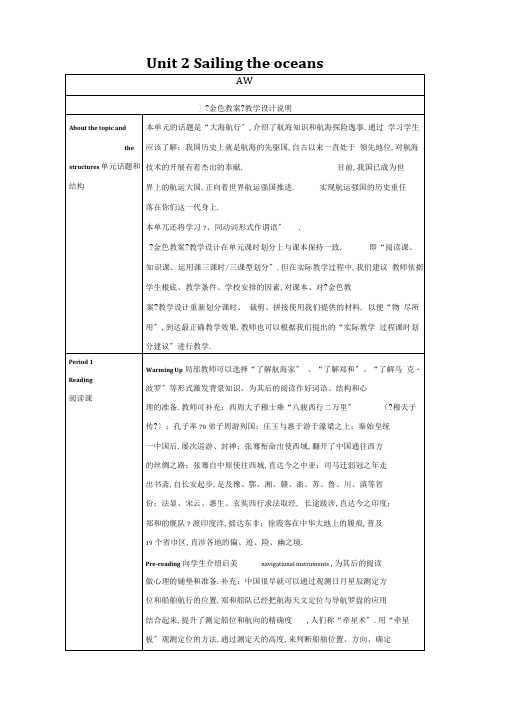
Unit 2 Sailing the oceansPart 1 Teaching Design第一局部教学设计Period 1 A sample lesson plan for reading(SAILING THE OCEANS)IntroductionIn this period, after the warming up, students will first be guided to learn about navigational instruments.Then they will be helped to read an exposition about sailing the oceans.Three “WarmingUp" designs are presented in this book for teachers reference. Computer and overhead projector may be used to a id the teaching and learning.Objectives■To help students learn to express causes and effects■To help students learn to read an exposition about sailing the oceans■To help students better understand a sailing〞■To help students learn to use some important words and expressions■To help students identify examples of the future passive voice in the textFocusAidsMultimedia facilities, tape-recorder, photos, diagramsProcedures1.Warming up(1)Warming up by leaning about navigatorA navigator is the person onboard a ship responsible for the navigation of the vessel. On aircraft, the position may also be referred to as a flight officer. The navigator's responsibilities include planning the journey, advising the captain (or pilot) while en route, and ensuring that hazards or obstacles are avoided.(2)Warming up by talking about Zheng He's Seven VoyagesIn July 11, 1405, the eunuch Zheng He of the Ming Dynasty royal court set out on his first overseas voyage.In the following 28 years, this navigator proceeded to carry out six more voyages, accompanied by a huge entourage of nearly 30,000 people. By traveling throughout Southeast Asia, and around the Indian Ocean to the Red Sea and East Africa, he also landed at over thirty different nations. He was the earliest largest scale navigation in world history, coming more than half a century earlier than Columbus'famous exploits...(3)Warming up by looking and listeningHello, class. Do you know this man? Yes, he is Marco Polo.Marco Polo (1254-1324), is probably the most famous Westerner traveled on the Silk Ro ad. He excelled all the other travelers in his determination, his writing, and his influence. His journey through Asia lasted 24 years. He reached further than any of his predecessors, beyond Mongolia to Chin a. He became a confidant of Kublai Khan (1214-1294). He traveled the whole of China and returned to tell the tale, which became the greatest travelogue.2.Pre-reading by learning about navigational instruments◊ artificial horizon, flight indicator, gyro horizon - a navigational instrument based on a gyroscope;provides an artificial horizon for the pilot◊ compass - navigational instrument for finding directions◊ depth finder - navigational instrument used to measure the depth of a body of water (as by ultrasound or radar)◊inclinometer - an instrument showing the angle that an aircraft makes with the horizon◊instrument - a device that requires skill for proper use◊asdic, echo sounder, sonar - a measuring instrument that sends out an acoustic pulse in water and measures distances in terms of the time for the echo of the pulse to return; sonar is an acronym for sound navigation ranging; asdic is an acronym for anti-submarine detection investigation committee3.Reading for formsRead the text SAILING THE OCEANS on page 12 to: cut/ the sentence into thought groups, blacken the predicative, darken the connectives and underline all the useful expressions.4.Copying useful expressions and making sentencesYou are going to copy in your notebook all the useful expressions and make sentences of your own with them.5. Transforming information Next you are going to read the text again to complete the chart below.7. Making a diagram of SAILING THE OCEAN8. Closing down by answering comprehension questions1. What is the main topic of this passage?A. The voyages of the travelers before the 17th centuryB. How to plot a ship ' s position on a mapC. How did ancient men navigate so wellD. Use nature to aid navigation2. Ancient navigators use navigational instruments to help them.A. find celestial bodiesB. predict the weatherC. explore the seaD. find latitude…,rather •・ as one of the points of3.The author of the passage implies that the ancient navigators were.A. hard-workingB. braveC. intelligentD. energetic4.According to the passage,.A.the ancient accomplished navigators were able to use South Star to plot their positions .B.Sea birds could be used to show the way to land when it was nowhere to be seen .C.Wise seamen used the snows to direct their sailing .D.The sextant proved to be the most accurate and reliable of these early navigational instruments. (Keys: BDCB )。
(英语)人教版选修9教案:Unit2 Sailing the oceans P3
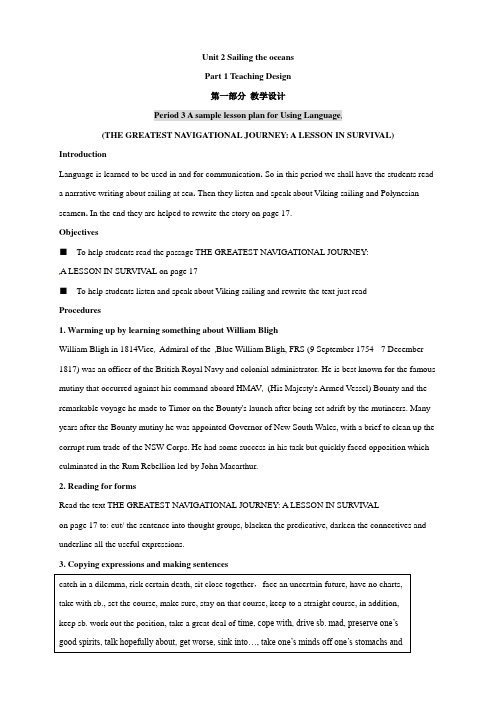
Unit 2 Sailing the oceansPart 1 Teaching Design第一部分教学设计Period 3 A sample lesson plan for Using Language(THE GREATEST NA VIGATIONAL JOURNEY: A LESSON IN SURVIV AL) IntroductionLanguage is learned to be used in and for communicatio n. So in this period we shall have the students read a narrative writing about sailing at se a. Then they listen and speak about Viking sailing and Polynesian seame n. In the end they are helped to rewrite the story on page 17.Objectives■To help students read the passage THE GREATEST NA VIGATIONAL JOURNEY:A LESSON IN SURVIV AL on page 17■To help students listen and speak about Viking sailing and rewrite the text just readProcedures1. Warming up by learning something about William BlighWilliam Bligh in 1814Vice Admiral of the Blue William Bligh, FRS (9 September 1754 - 7 December 1817) was an officer of the British Royal Navy and colonial administrator. He is best known for the famous mutiny that occurred against his command aboard HMA V(His Majesty's Armed Vessel) Bounty and the remarkable voyage he made to Timor on the Bounty's launch after being set adrift by the mutineers. Many years after the Bounty mutiny he was appointed Governor of New South Wales, with a brief to clean up the corrupt rum trade of the NSW Corps. He had some success in his task but quickly faced opposition which culminated in the Rum Rebellion led by John Macarthur.2. Reading for formsRead the text THE GREATEST NA VIGA TIONAL JOURNEY: A LESSON IN SURVIV ALon page 17 to: cut/ the sentence into thought groups, blacken the predicative, dark en the connectives and underline all the useful expressions.3. Copying expressions and making sentences4. Listening and speaking about Viking sailing and Polynesian seamen●The name Viking is a borrowed word from the native Scandinavian term for the Norse warriors who raided the coasts of Scandinavia, the Bri tish Isles, and other parts of Europe from the late 8th century to the 11th century. Vikings traveled to the west and Varangians, who were best known as the Varangian Guards of the Byzantine emperors, to the east. This period of European history (generally dated to 793 - 1066 AD) is referred to as the Viking Age.●Where is Polynesia?A division of Oceania including scattered islands of the central and southern Pacific Ocean roughly between New Zealand, Hawaii, and Easter Island. The larger islands are volcanic, the smaller ones generally coral formations.Now go to page 19. Let’s go to listen to something about Viking sa iling the oceans. While listening try to circle those aids in the box on page 19 that the early sailors used to find their ways at se a.Now you shall listen to the tape once a gain to fill in the chart on page 19.On page 20 there are four sayings from Polynesian seame n. What does each of them mean? Now in pairs talk about each of the sayings.5. Closing down by w riting, by imitation, a passage of your own based on the text on page 17father measured our position listening to the local new on theicult for us to get acorrect directaight course pretty well. In addition, my father kept me busy singing songs to overcome our You could not imagi ne a more disturbing sight than what we looked like when arriving inthe。
(英语)人教版选修9教案:Unit2 Sailing the oceans S2

Unit 2 Sailing the oceansPart 2 Teaching Resources第二部分教学资源Section 2 Notes to difficult sentences from Unit 2Sailing the oceans1.So accomplished navigators were able to use it to plot their positio ns.熟练的领航员就能够用它来确定自己的位置。
句中accomplished是形容词,意思是“优秀的,熟练的”,作定语修饰其后的名词。
Accomplished 的用法如下:已完成的; 已达到的:accomplished facts 既成事实;学识渊博的, 技术高超的, 有成就的:an accomplished cook 厨艺精湛的厨师,Judy is accomplished in English teaching. 茱蒂擅长英语教学;有教养的, 优雅的:an accomplished lady 才女2.On a clear day especially during the summer the sailors could use the sun overhead at midday to navigate by.在晴朗的日子,尤其是在夏天,水手可以使用正午头顶的太阳来引导他们航行。
句中to navigate by作目的状语,修饰谓语动词,其中的by是介词,它的逻辑宾语是前面的the sun。
类似的例句有:I have no topics to write about.He found some pens to write with. He is not the person to get along with.3.Sea birds could be used to show the way to land when it was nowhere to be seen.看不到陆地的时候,可以利用海鸟来定位通向陆地的方向。
人教版高中英语选修9《Unit 2 Sailing the oceans》教案
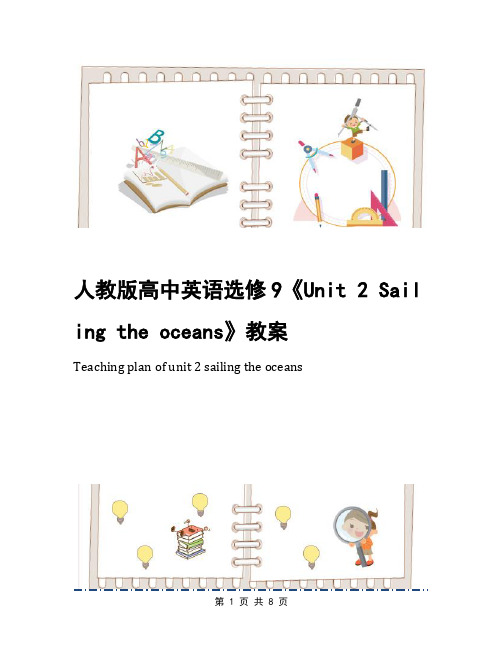
人教版高中英语选修9《Unit 2 Sail ing the oceans》教案Teaching plan of unit 2 sailing the oceans人教版高中英语选修9《Unit 2 Sailing the oceans》教案前言:英语作为在许多国际组织或者会议上都是必需语言,几乎所有学校选择英语作为其主要或唯一的外语必修课。
英语教学涉及多种专业理论知识,包括语言学、第二语言习得、词汇学、句法学、文体学、语料库理论、认知心理学等内容。
本教案根据英语课程标准的要求和教学对象的特点,将教学诸要素有序安排,确定合适的教学方案的设想和计划、并以启迪发展学生智力为根本目的。
便于学习和使用,本文档下载后内容可按需编辑修改及打印。
教学准备教学目标1、知识目标(1).理解并记住Reading部分本单元的单词和短语。
(2).理解并掌握整个故事的情节,并能填写summary.2、能力目标(1)充分发挥学生的主体地位,调动学生思维的积极性,提高综合语言的运用能力(2)通过对学生说读写的训练,增大学生的语言输入,增强其语言输出能力。
3、情感、态度、价值观目标学生分析布莱船长在40多天的航程中所采用的航海技术以及所表现出的领导才能。
同时,又适时地对他们进行情感教育:在任何困难面前绝不畏惧,不抛弃,不放弃。
教学重难点教学重点与难点:读写说均为本节课的重点,写和说部分应为难点,需加大指导和练习。
教学过程Teaching procedures:Lead-in:通过歌曲Sailing导入,让学生在轻松愉悦的音乐下近入新课的学习之中。
促使学生积极主动地进入学习状态。
ComprehensionStep I Please Skim the passage and get the main idea.Step II. Scan the passage: True or False.1.I was forced to join Captain Bligh in the small boat.2.After the crew took over the ship “Bounty”, Captain Bligh was allowed to take with him a chart , a compass and a quadrant.3.It was very difficult for us to get a correct reading from the quadrant as the boat moved constantly during the course.4.Cap tain Bligh used a system called “dead reckoning” and he knew there was land directly southwest of their original position.5.Captain Bligh was as weak as the rest of us but he was determined not to give up.6.Captain Bligh kept us busy and tried to takeour minds off our stomachs and thirst all the way.7.We finally escaped the jaws of death andarrived in Timor over fifty days after being set loose in our small boat.Step III. Group work: further reading.When captain Blight returned home he was honored as a hero. Discuss in groups whether he should receive a special medal or not.Step IV. Affective educationAfter learning the text, as senior three students, what can we learn from Captain Blight in our life?Step V. Summary:I am _____ to have sailed with Captain Bligh on his journey of over40 days through about4,000 miles in an open boat ______the Pacific Ocean in 1789.In the beginning, on our ________(depart), some of the crew took _____theship and the captain___________(deposit) into a small boat. Thus we werecaught _____a dilemma. We decided to stick with him _______thick and thin though we seemed to face_____uncertaindeath.During the long and toughjourney, we encountered many unexpected hardships. Despite _____(lack) of foodand water, he kept us _______(occupy) and cheerful to take our minds ____troubles. All the way he taught us how to cope _______various situations. Finallythey arrived at Timor __________(success)andthey were honored as _______(hero).The story shows that one man’ssp irit and his determination should not ________ (defeat) by circumstances.Complexsentences(分析并翻译1-2个长难句)Challengeyourself!---Grammar Filling1.I’m proud to have sailed withCaptain Blight ____his journey of over 40 days _________about4,000miles ____anopen small boat _______ the Pacific Ocean.2.On our _________(depart) from Tahiti, some crew took _____the ship. And those of us onboard____________(catch) in a dilemma.3.As you can see from the map we kept_____a straight course pretty well.4.The captain kept us busy________ (read) the tables to work out our position .5.It was the extreme lack of waterthat was hard to cope with ______________ (psychology)6.He kept us busy and tried to take our minds课后习题Challenge yourself!---Grammar Filling1.I’m proud to have sailed with Captain Blight ____his journey of over 40 days _________about4,000miles ____an open small boat _______ the Pacific Ocean.2.On our _________(depart) from Tahiti, some crew took _____the ship. And those of us on board____________(catch) in a dilemma.3.As you can see from the map we kept _____a straight course pretty well.4.The captain kept us busy________ (read) the tables to work out our position .5.It was the extreme lack of water that was hard to cope with ______________ (psychology)6.He kept us busy and tried to take our minds_____our __________(stomach).-------- Designed By JinTai College ---------。
英语:Unit 2《Sailing the oceans》教案-Listening and Speaking(新人教版选修9)

Unit 2 Sailing the oceansListening and Speaking---教案Teaching Aims: 教学目的1.Review the words and structures in the last period.2.Finish the listening exercises in this part and improve the students’ listening ability.3.Talk about sailing.Teaching Important Points:教学难点Finish the listening exercises.Teaching Methods:教学方法1.Talking method to improve the students’ speaking ability.2.Listening method to train the students’ listening ability.3.Pair wok to make every student take an active part in class.Teaching Aids:教学工具1. a computer;2. coursewareTeaching proceduresStep1 GreetingsGreet the whole class as usual.Step2 RevisionCheck the homework exercises.Step3 ListeningListen to the tape and ask the students to finish exercise 1—3 on page 19. Suggested answers:Answer key for Exercise 1:maps; stars; clouds; waves; currents; birdsAnswer key for Exercise 2;Answer key for Exercise 3:1 Vikings used to prefer to say following the coastline so they could check that they were on the correct route.2 Vikings used birds and natural features likemountains, to direct their ships.Step 4 SpeakingAsk the students to discuss the sayings in exercise 4 and get their ideas together. Step 5 HomeworkFinish the exercises in the student’s workbook.。
人教版高中英语选修九 unit2 sailing the oceans 单元课件(共112张PPT)

Our American friends are making a tour of Shanghai. 我们的美国朋友正在对上海进行巡回旅 行。
He came back home after years of foreign travel. 在多年的国外旅行后他回到了家。
Unit 2 Sailing oceans
1. I belieபைடு நூலகம்e he is an honest man,___Is_n_’t_h_e_?____
2. We don’t think Tom has broken the regulations,___h_a_s_h_e?
3. Mary guessed his father must have bought her a beautiful shirt,__d_id_n_’_t she
弄明白
⑶ I can’t work out Geoff ; one day he’s friendly ,the next day he ignores me completely. 明白 ⑷ I haven’t worked out who’s gong to look after the kids tonight. 计划
在经纬度未能绘出航船在地图上的 位置之前,我们很想知道航海员是怎样 在海上探险的。
① may/might well 很可能,极有可能 These are excellent photographs and we
may well use them in our magazine. 这些是很不错的照片,我们很有可能
(英语)人教版选修9教案:Unit2 Sailing the oceans P2
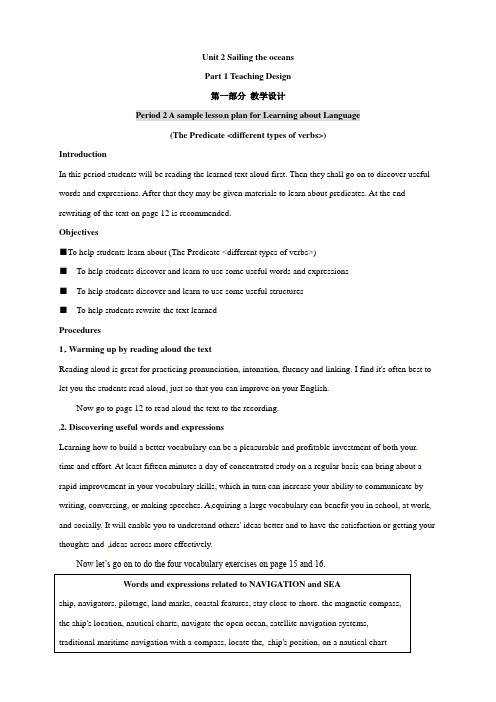
Unit 2 Sailing the oceansPart 1 Teaching Design第一部分教学设计Period 2 A sample lesso n plan for Learning about Language(The Predicate <different types of verbs>)IntroductionIn this period students will be reading the learned text aloud first. Then they shall go on to discover useful words and expressions. After that they may be given materials to learn about predicates. At the end rewriting of the text on page 12 is recommended.Objectives■To help students learn about (The Predicate <different types of verbs>)■To help students discover and learn to use some useful words and expressions■To help students discover and learn to use some useful structures■To help students rewrite the text learnedProcedures1. Warming up by reading aloud the textReading aloud is great for practicing pronunciation, intonation, fluency and linking. I find it's often best to let you the students read aloud, just so that you can improve on your English.Now go to page 12 to read aloud the text to the recording.2. Discovering useful words and expressionsLearning how to build a better vocabulary can be a pleasurable and profitable investment of both yourtime and effort. At least fifteen minutes a day of concentrated study on a regular basis can bring about a rapid improvement in your vocabulary skills, which in turn can increase your ability to communicate by writing, conversing, or making speeches. A cquiring a large vocabulary can benefit you in school, at work, and socially. It will enable you to understand others' ideas better and to have the satisfaction or getting your thoughts and ideas across more effectively.Now let’s go on to do the four vocabulary exercises on page 15 and 16.3. Learning about predicates in grammarone of the two main parts of a sentence (the other being the predicate modifies). The predicate must contain a verb and can containIt hasn’t worked for years.B.4. Revising useful structuresYou are going to read the text on page 12 SAILING THE OCEANS to underline all the predicates to understand their structures and functions.Now you may go on to do the two structure exercises on page 16 and 17.5. Closing down by rewriting the text on page 12ed Radios could b。
(英语)人教版选修9教案:Unit2 Sailing the oceans P2
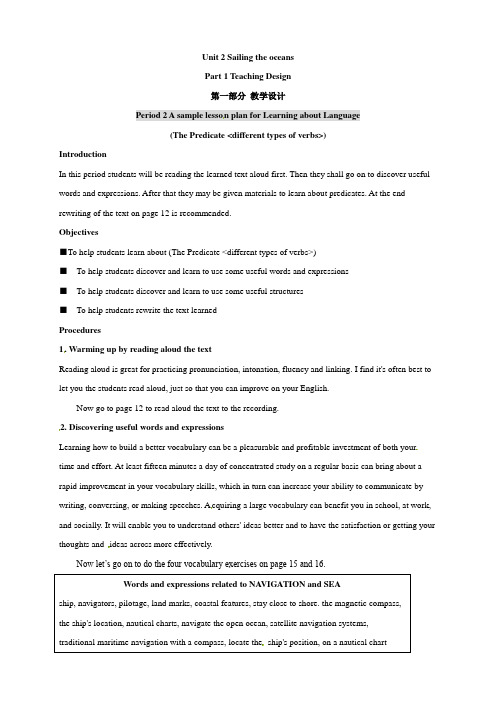
Unit 2 Sailing the oceansPart 1 Teaching Design第一部分教学设计Period 2 A sample lesso n plan for Learning about Language(The Predicate <different types of verbs>)IntroductionIn this period students will be reading the learned text aloud first. Then they shall go on to discover useful words and expressions. After that they may be given materials to learn about predicates. At the end rewriting of the text on page 12 is recommended.Objectives■To help students learn about (The Predicate <different types of verbs>)■To help students discover and learn to use some useful words and expressions■To help students discover and learn to use some useful structures■To help students rewrite the text learnedProcedures1. Warming up by reading aloud the textReading aloud is great for practicing pronunciation, intonation, fluency and linking. I find it's often best to let you the students read aloud, just so that you can improve on your English.Now go to page 12 to read aloud the text to the recording.2. Discovering useful words and expressionsLearning how to build a better vocabulary can be a pleasurable and profitable investment of both yourtime and effort. At least fifteen minutes a day of concentrated study on a regular basis can bring about a rapid improvement in your vocabulary skills, which in turn can increase your ability to communicate by writing, conversing, or making speeches. A cquiring a large vocabulary can benefit you in school, at work, and socially. It will enable you to understand others' ideas better and to have the satisfaction or getting your thoughts and ideas across more effectively.Now let’s go on to do the four vocabulary exercises on page 15 and 16.3. Learning about predicates in grammarone of the two main parts of a sentence (the other being the predicate modifies). The predicate must contain a verb and can containIt hasn’t worked for years.B.4. Revising useful structuresYou are going to read the text on page 12 SAILING THE OCEANS to underline all the predicates to understand their structures and functions.Now you may go on to do the two structure exercises on page 16 and 17.5. Closing down by rewriting the text on page 12ed Radios could b。
英语:Unit 2《Sailing the oceans》教案-Grammar(新人教版选修9)
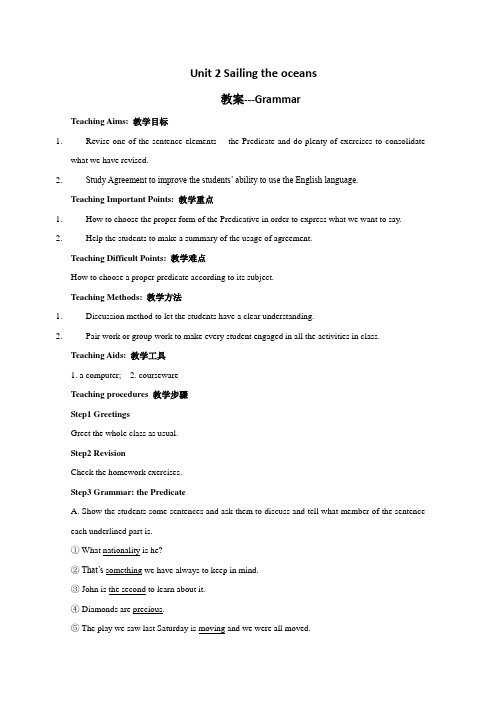
Unit 2 Sailing the oceans教案---GrammarTeaching Aims: 教学目标1.Revise one of the sentence elements ---the Predicate and do plenty of exercises to consolidatewhat we have revised.2.Study Agreement to improve the students’ ability to use the English language.Teaching Important Points: 教学重点1.How to choose the proper form of the Predicative in order to express what we want to say.2.Help the students to make a summary of the usage of agreement.Teaching Difficult Points: 教学难点How to choose a proper predicate according to its subject.Teaching Methods: 教学方法1.Discussion method to let the students have a clear understanding.2.Pair work or group work to make every student engaged in all the activities in class.Teaching Aids: 教学工具1. a computer;2. coursewareTeaching procedures 教学步骤Step1 GreetingsGreet the whole class as usual.Step2 RevisionCheck the homework exercises.Step3 Grammar: the PredicateA. Show the students some sentences and ask them to discuss and tell what member of the sentenceeach underlined part is.① What nationality is he?②That’s something we have always to keep in mind.③ John is the second to learn about it.④ Diamonds are precious.⑤ The play we saw last Saturday is moving and we were all moved.⑥ All we can do is to go and meet him.⑦ He has been away for 3 years.⑧ She is not what she used to be.B. Something about the predicate:谓语谓语用来说明主语的动作或状态,由动词或动词词组担任。
(英语)人教版选修9教案:Unit2 Sailing the oceans S1
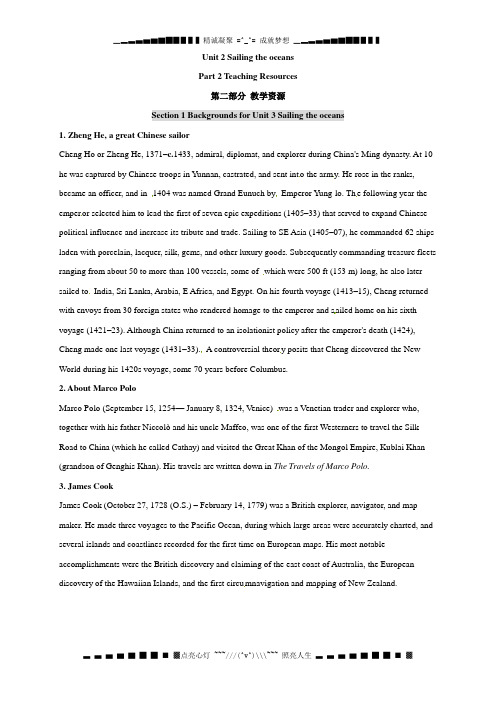
Unit 2 Sailing the oceansPart 2 Teaching Resources第二部分教学资源Section 1 Backgrounds for Unit 3 Sailing the oceans1. Zheng He, a great Chinese sailorCheng Ho or Zheng He, 1371–c.1433, admiral, diplomat, and explorer during China's Ming dynasty. At 10 he was captured by Chinese troops in Y unnan, castrated, and sent int o the army. He rose in the ranks, became an officer, and in 1404 was named Grand Eunuch by Emperor Yung-lo. Th e following year the emper or selected him to lead the first of seven epic expeditions (1405–33) that served to expand Chinese political influence and increase its tribute and trade. Sailing to SE Asia (1405–07), he commanded 62 ships laden with porcelain, lacquer, silk, gems, and other luxury goods. Subsequently commanding treasure fleets ranging from about 50 to more than 100 vessels, some of which were 500 ft (153 m) long, he also later sailed to India, Sri Lanka, Arabia, E Africa, and Egypt. On his fourth voyage (1413–15), Cheng returned with envoys from 30 foreign states who rendered homage to the emperor and s ailed home on his sixth voyage (1421–23). Although China returned to an isolationist policy after the emperor's death (1424), Cheng made one last voyage (1431–33). A controversial theor y posits that Cheng discovered the New World during his 1420s voyage, some 70 years before Columbus.2. About Marco PoloMarco Polo (September 15, 1254— January 8, 1324, V enice) was a Venetian trader and explorer who, together with his father Niccolò and his uncle Maffeo, was one of the first Westerners to travel the Silk Road to China (which he called Cathay) and visited the Great Khan of the Mongol Empire, Kublai Khan (grandson of Genghis Khan). His travels are written down in The Travels of Marco Polo.3. James CookJames Cook (October 27, 1728 (O.S.) – February 14, 1779) was a British explorer, navigator, and map maker. He made three voyages to the Pacific Ocean, during which large areas were accurately charted, and several islands and coastlines recorded for the first time on European maps. His most notable accomplishments were the British discovery and claiming of the east coast of Australia, the European discovery of the Hawaiian Islands, and the first circu mnavigation and mapping of New Zealand.。
人教版高中英语选修九第3讲:Unit 2 sailing the oceans-词汇篇(教师版)
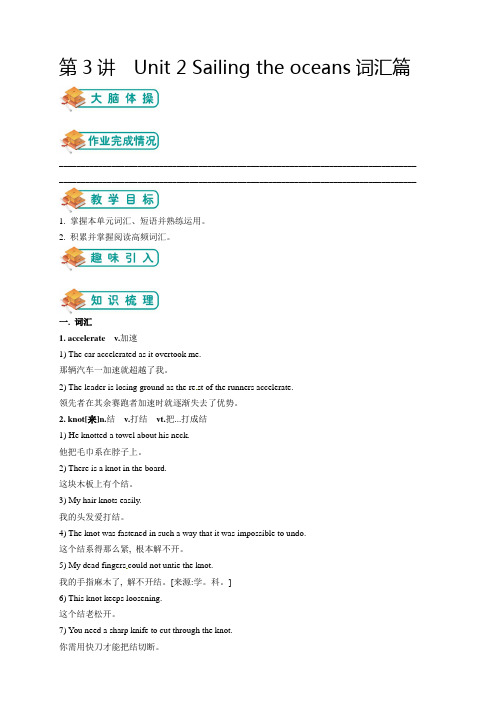
第3讲Unit 2 Sailing the oceans词汇篇__________________________________________________________________________________ __________________________________________________________________________________1. 掌握本单元词汇、短语并熟练运用。
2. 积累并掌握阅读高频词汇。
一. 词汇1. accelerate v.加速1) The car accelerated as it overtook me.那辆汽车一加速就超越了我。
2) The leader is losing ground as the re st of the runners accelerate.领先者在其余赛跑者加速时就逐渐失去了优势。
2. knot[来]n.结v.打结vt.把...打成结1) He knotted a towel about his neck.他把毛巾系在脖子上。
2) There is a knot in the board.这块木板上有个结。
3) My hair knots easily.我的头发爱打结。
4) The knot was fastened in such a way that it was impossible to undo.这个结系得那么紧, 根本解不开。
5) My dead fingers could not untie the knot.我的手指麻木了, 解不开结。
[来源:学。
科。
]6) This knot keeps loosening.这个结老松开。
7) You need a sharp knife to cut through the knot.你需用快刀才能把结切断。
3. simplify v.简化,使单纯vt. 简化1) She simplified the instructions so that the children could understand them. 她简化了指令以便于儿童理解。
- 1、下载文档前请自行甄别文档内容的完整性,平台不提供额外的编辑、内容补充、找答案等附加服务。
- 2、"仅部分预览"的文档,不可在线预览部分如存在完整性等问题,可反馈申请退款(可完整预览的文档不适用该条件!)。
- 3、如文档侵犯您的权益,请联系客服反馈,我们会尽快为您处理(人工客服工作时间:9:00-18:30)。
2021人教版选修九unit2《sailingtheoceans》word教案2Part One: Teaching DesignPeriod 1: A sample lesson plan for reading(SAILING THE OCEANS)AimsTo help students read about sailing the oceansTo help students learn about the predicateProcedures■Warming up by le aning about navigatorWhat is a navigator?A navigator is the person onboard a ship responsible for the navigation of the vessel. On aircraft, the position may also be referred to as a flight officer. The navigator's responsibilities include planning the journey, advising the captain (or pilot) while en route, and ensuring that hazards or obstacles are avoided.What is exploration?Exploration is the act of searching or traveling for the purpose of discovery, e.g. of unknown regions, including space (space exploration), or oil, gas, coal, ores, water (also known as prospecting), or information.Exploration has existed as long as human beings, but its peak is seen as being during the Age of Exploration when European navigators travelled around the world.In scientific research, exploration is one of three purposes of research (the other two being description and explanation). Exploration is the attempt to develop an initial, rough understanding of some phenomenon.■Warming up by talking about Zheng He's Seve n V oyagesIn July 11, 1405, the eunuch Zheng He of the Ming Dynastyroyal court set out on his first overseas voyage.In the following 28 years, this navigator proceeded to carryout six more voyages, accompanied by a huge entourage ofnearly 30,000 people. By traveling throughout Southeast Asia, and around the Indian Ocean to the Red Sea and East Africa, he also landed at over thirty different nations.He was the earliest largest scale navigation in world history, coming more than half a century earlier than Columbus'famous exploits...■Warming up by looking and listeningHello, class. Do you know this man? Yes, he is Marco Polo.Marco Polo (1254-1324), is probably the most famous Westerner traveled on the Silk Road. He excelled all the other travelers in his determination, his writing, and his influence. His journey through Asia lasted 24 years. He reached further than any of his predecessors, beyond Mongolia to China. He became a confidant of Kublai Khan (1214-1294). He traveled the whole of China and returned to tell the tale, which became the greatest travelogue.I. Pre-readingWhat are navigational instruments?●Navigational instruments were built in the age of exploration to guide the explorers to their destinations.●navigational instrument - an instrument used for navigatingartificial horizon, flight indicator, gyro horizon - a navigational instrument based on a gyroscope; provides an artificial horizon for the pilotcompass - navigational instrument for finding directionsdepth finder - navigational instrument used to measure the depth of a body of water (as by ultrasound or radar)inclinometer - an instrument showing the angle that an aircraft makes with the horizon instrument - a device that requires skill for proper useasdic, echo sounder, sonar - a measuring instrument that sends out an acoustic pulse in water and measures distances in terms of the time for the echo of the pulse to return; sonar is an acronym for sound navigation ranging;asdic is an acronym for anti-submarine detection investigation committeeII. Reading for formsRead the text SAILING THE OCEANS on page 12 to: cut/ the sentence intothought groups, blacken the predicative, darken the connectives and underline all the useful expressions.SAILING THE OCEANSWe may well wonder/ how seamen explored the oceans/ before latitude /and longitude made it possible /to plot a ship's position/ on a map.The voyages of travelers/ before the 17th century /show that /they were not at the mercy of the sea /even though they did not have modern navigational aids.So/ how did they navigate so well? Read these pages/ from an encyclopedia.Page l:page 2:III. Copying useful expressions and making sentencesYou are going to copy in your notebook all the useful expressions and make sentences of your own with them.IV. Transforming informationNext you are going to read the text again to complete the chart below.SAILING THE OCEANS■Using navigational instruments to help■Using nature to help keeping alongside thecoastline●finding longitude●Using celestial bodies: North Star; Sun;Clouds●Using wildlife: Seaweed; Birds●Finding latitude: The Bearing Circle; TheAstrolabe; The Quadrant; The sextant●Using the weather: Fog; Winds●Using the seaV. Closing down by reading more about sailing the oceansSailing the oceansFor thousands of years, people have been sailing across the oceans and around the world. Knowledge of ocean currents and wind patterns has allowed people to reliably reach their destinations even after crossing huge expanses of open ocean.In this photograph, a sailboat uses wind and currents to move among the islandsof Micronesia. Before modern navigational techniques were developed,navigators in the South Pacific relied on stick charts to indicate island locationsrelative to winds andcurrents.Today, racing sailboats is a sport, and teams test their skills by racing around theworld. Navigation now relies on satellites, but knowledge of wind patterns, ocean currents, and potential obstacles in unfamiliar waters is still essential for sailing.In this investigation, you'll plot a course for racing around the world in a sailboat. You'll explore some of the obstacles you might encounter on your route; then you'll have the opportunity to revise your route to improve your speed.Additional MaterialsComplete the summary of the story with one word in each blank.While sailing the _____1___we may make use of both the nature ___2___ the navigational。
